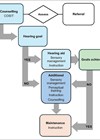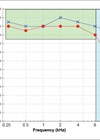Published in print under the title
Hearing care and dementia: professional insights on the new Lancet Commission findings
The Lancet Commission on ‘Dementia prevention, intervention and care: 2024 report’ highlights a list of potential modifiable factors to reduce dementia risk. As with the 2017 and 2022 publications, mid-life hearing loss is one such risk. Here, a range of key opinion leaders give their thoughts on the commission’s 2024 publication. Across the three articles, the authors present a synopsis of the recommendations pertinent to hearing loss and probe the evidence, the missing gaps and their own thoughts on a direction for research to unpack the emotive association between dementia and hearing loss.
See also:
Commentary: dementia, hearing loss, and the danger of professional rabbit holes
Beyond hearing aids: early interventions in hearing care to lower dementia risk
The 2024 Lancet Commission report presents updated meta-analyses on the risk of hearing loss in the development of dementia and the strong association between both conditions, synthesising up-to-date evidence on worldwide risk and prevalences.
Recent studies have suggested potential mechanisms to explain how hearing loss might lead to increased dementia risk, with reference to Griffiths et al [1]. The potential for hearing aids to reduce dementia risk remains of great interest, supported by an increasing number of observational studies. The report refers to the ACHIEVE study, which showed that hearing aids slowed cognitive decline in a subgroup with higher dementia risk due to older age, lower baseline cognition, cardiovascular and socioeconomic factors, although there was no effect at whole population level [2].

Whilst debate about the mechanism of association between hearing loss and dementia goes on, it is important that providers and commissioners begin to consider, and make preparations for, how hearing health and cognitive health can be addressed as related comorbidities in clinical services for older people. Researchers at the NIHR UCLH BRC surveyed 156 UK audiologists and identified that the vast majority recognised significant memory problems in their older adult patients and felt it would be useful to assess cognition in this older population, however less than 5% did so. The main barriers cited were lack of training and not knowing what to do for those identified with cognitive impairment [3]. This highlights the need for further research into developing operational solutions that better integrate hearing and cognitive healthcare.
In their ‘Key Messages’, The Lancet reports recommended early multicomponent interventions – there are now 14 risk factors with the addition of vision loss and high cholesterol – to prevent dementia, prioritising equity of care. Making hearing aids accessible for people with hearing loss is one recommended specific action. With substantial advances in pharmacological and non-pharmacological interventions following dementia diagnosis, early identification of cognitive impairment in those with hearing loss is all the more important. Additionally, low adoption and inconsistent use of hearing aids among those with cognitive impairment – due to forgetfulness, practical difficulties, or ambivalence about benefits [4] – suggests a need for tailored hearing care in this population.
To this end, we assessed the feasibility of introducing a brief cognitive assessment in NHS hearing aid appointments for older adults. We demonstrated this was feasible and acceptable to patients, carers and audiologists, has the potential to improve early detection of cognitive impairment and help determine appropriate hearing support. However, implementing this requires extra time with significant resource implications.
It is therefore essential that we work with all stakeholders in the fields of hearing and cognitive health, including commissioners, professional organisations, service providers and service users. Work is ongoing gathering data on barriers and facilitators involved in developing guidance, commissioning and providing integrated services, and expectations and experiences of service users. We are in the process of developing consensus through an international Delphi study on how best to detect cognitive impairment in audiology services and tailor hearing care for those with signs of early cognitive impairment. The main output will be a consensus document that will form the basis for professional organisations to issue guidance and development of training for audiologists on the topic of hearing and cognitive health.
There are certainly evidence gaps pertaining to the causal link between hearing loss and dementia. However, aligning cognitive and hearing healthcare pathways needs to be a priority. In their 2024 position statement on the future of NHS adult hearing loss management, the British Academy of Audiology acknowledges this and recommends closer collaboration across specialist teams providing care for adults with hearing loss, and providers should link into education and research, local authority groups and other stakeholders [5]. There is much work to be done to achieve this.
References
1. Griffiths TD, Lad M, Kumar S, et al. How Can Hearing Loss Cause Dementia? Neuron 2020;108(3):401–12.
2. Lin FR, Pike JR, Albert MS, et al. Hearing intervention versus health education control to reduce cognitive decline in older adults with hearing loss in the USA (ACHIEVE): a multicentre, randomised controlled trial. Lancet 2023;402(10404):786–97
3. Omar R, Kuo L, Costafreda SG, et al. Managing comorbid cognitive impairment and hearing loss in older adults: a UK survey of audiology and memory services. Age Ageing 2023;52(5):afad080.
4. Gregory S, Billings J, Wilson D, et al. Experiences of hearing aid use among patients with mild cognitive impairment and Alzheimer’s disease dementia: A qualitative study. SAGE Open Med 2020;8:2050312120904572.
5. British Academy of Audiology (2024) BAA Position Statement: The Future of NHS Adult Hearing Loss Management.
https://www.baaudiology.org/app/
uploads/2024/08/BAA-Position-Statement
-on-NHS-Adult-Hearing-Loss-Management-190824.pdf
[Link last accessed October 2024].











